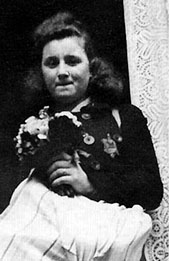Search for Names, Places and Biographies
Already layed Stumbling Stones
Suche
Ursula Geistlich * 1924
Bornstraße 22 (Eimsbüttel, Rotherbaum)
1943 Theresienstadt
Tot 1945
further stumbling stones in Bornstraße 22:
Emma Cohen, Jenny Drucker, Minna Drucker, Selma Isenberg, Alfred Pein, Emmy Pein, Abraham Schwarzschild, Betty Schwarzschild, Sara Schwarzschild, Ignatz Schwarzschild, Rachel Süss, Clara Weil, Rosa Wolff, Bella Wolff
Ursula Geistlich, born on 18 Aug. 1924, deported on 5 May 1943 to Theresienstadt
Ursula Geistlich performed forced labor in a Hamburg company. Probably that was the reason why she was not deported along with her three sisters and two nieces to Theresienstadt in Mar. 1943. Perhaps she hoped that the labor duty would protect her from deportation. Not even for two months, she lived without her siblings but together with her parents at Bornstrasse 22.
On 5 May 1943, her parents, Elcka and Paul Geistlich waited in vain for their daughter. Ursula Geistlich had been arrested at her workplace and taken directly to the Hannoversche Bahnhof. She was among 51 Hamburg Jews deported to Theresienstadt on that day. The 19-year old came across her sisters and nieces there. Only four weeks later, her mother along with Ursula’s youngest sister were also taken to the concentration camp. In three transports from Hamburg to Theresienstadt of eleven overall, eight members of the Geistlich family were deported. The father, Paul Geistlich, was not Jewish and stayed behind in Hamburg.
Only few of the deportees survived the imprisonment in Theresienstadt. Elcka Geistlich returned to Hamburg along with four of her daughters and two grandchildren in 1945. Ursula Geistlich was not among them. Her whereabouts are unknown to this day. Exact recollections have faded. Ruth Dräger, née Geistlich, who lives in Hamburg today and was 15 years old at the time of these events, says she was told later that her aunt, Ursula Geistlich, had married in Theresienstadt and followed her husband on a transport from Theresienstadt to Ravensbrück. It was not possible to clear up her fate.
Translator: Erwin Fink
Kindly supported by the Hermann Reemtsma Stiftung, Hamburg.
© Karin Guth


